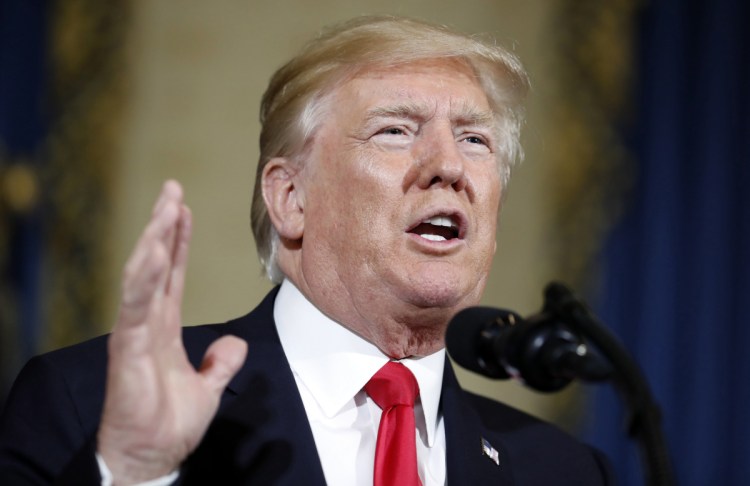WASHINGTON — The Trump administration is freezing payments under an “Obamacare” program that protects insurers with sicker patients from financial losses, a move expected to add to premium increases next year.
At stake are billions in payments to insurers with sicker customers. The latest administration action could disrupt the Affordable Care Act, the health care law that has withstood President Trump’s efforts to completely repeal it.
In a weekend announcement, the Centers for Medicare and Medicaid Services said the administration is acting because of conflicting court rulings in lawsuits filed by some smaller insurers who question whether they are being fairly treated under the program.
The so-called “risk adjustment” program takes payments from insurers with healthier customers and redistributes that money to companies with sicker enrollees. Payments for 2017 are $10.4 billion. No taxpayer subsidies are involved.
The idea behind the program is to remove the financial incentive for insurers to “cherry pick” healthier customers. The government uses a similar approach with Medicare private insurance plans and the Medicare prescription drug benefit.
Major insurer groups said Saturday the administration’s action interferes with a program that’s working well.
The Blue Cross Blue Shield Association, whose members are a mainstay of Affordable Care Act coverage, said it was “extremely disappointed” with the administration’s action.
The Trump administration’s move “will significantly increase 2019 premiums for millions of individuals and small-business owners and could result in far fewer health plan choices,” association president Scott Serota said in a prepared statement. “It will undermine Americans’ access to affordable coverage, particularly those who need medical care the most.”
Serota noted that the payments are required by law and said he believes the administration has the legal authority to continue making them despite the court cases. He warned of “turmoil” as insurers finalize their rates for 2019.
America’s Health Insurance Plans, the main health insurance industry trade group, said in a statement that it is “very discouraged” by the Trump administration’s decision to freeze payments. “Costs for taxpayers will rise as the federal government spends more on premium subsidies,” the group said.
Rumors that the Trump administration would freeze payments were circulating late last week. The Saturday announcement via email was unusual for such a major step. The administration argued in its announcement that its hands were tied by conflicting court rulings in New Mexico and Massachusetts.
Medicare and Medicaid Administrator Seema Verma said the Trump administration was disappointed by a New Mexico court ruling that questioned the workings of the risk program for insurers.
The administration “has asked the court to reconsider its ruling, and hopes for a prompt resolution that allows (the government) to prevent more adverse impacts on Americans who receive their insurance in the individual and small group markets,” she said.
More than 10 million people buy individual health insurance plans through HealthCare.gov and state insurance marketplaces. The vast majority of those customers receives taxpayer subsidies under the Obama-era health law and would be shielded from premium increases next year.
The brunt of higher prices would fall on solid middle-class consumers who are not eligible for the income-based subsidies. Many of those are self-employed people and small-business owners, generally seen as a Republican constituency.
The latest “Obamacare” flare-up does not affect most people with employer coverage.
More than 20 million people have coverage through former President Barack Obama’s law. Close to half get subsidized private coverage that would be affected by Saturday’s Trump administration announcement. The other half are covered by expanded Medicaid.
Trump came into office promising a swift repeal of “Obamacare,” which he said he’d replace with a much better health plan. But the White House never produced a proposal, and legislation from congressional Republicans would have left millions uninsured, while undermining protections for people with pre-existing health problems.
The Republicans’ repeal drive collapsed last summer after Sen. John McCain, R-Ariz., cast a crucial “no” vote, with a thumbs down gesture that’s become a target of Trump criticism at campaign-style rallies.
Unable to totally repeal the law, the White House and the Republican-led Congress have taken a series of steps that make it harder for the ACA to work as intended. Among them:
• Repealing, effective next year, an unpopular requirement that most people carry health insurance or risk fines. The nonpartisan Congressional Budget Office estimates that will raise premiums by about 10 percent.
• Eliminating another set of payments to insurers, which covered discounts that the companies are required to provide low-income people on their copayments and deductibles.
• Slashing the advertising budget for HealthCare.gov even as the sign-up window was shortened by half.
• Clearing the way for low-cost insurance plans that cover less and may siphon healthier customers away from ACA plans.
Even so, enrollment under the health law has remained remarkably steady. But premiums for people who buy individual coverage and are not eligible for ACA subsidies have continued rising by double digits.
Send questions/comments to the editors.


